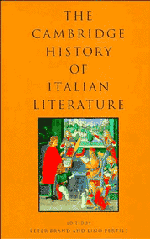Book contents
- Frontmatter
- Origins and Duecento
- The Trecento
- The Quattrocento
- The Cinquecento
- The Seicento: Poetry, Philosophy and Science
- Narrative prose and theatre
- The Settecento
- The Age of Romanticism (1800–1870)
- The Literature of United Italy (1870–1910)
- The Rise and Fall of Fascism (1910–45)
- 36 Poetry and the avant-garde
- 37 Philosophy and literature from Croce to Gramsci
- 38 The novel
- The Aftermath of the Second World War (1945–56)
- Contemporary Italy (since 1956)
- Bibliography
36 - Poetry and the avant-garde
from The Rise and Fall of Fascism (1910–45)
Published online by Cambridge University Press: 28 March 2008
- Frontmatter
- Origins and Duecento
- The Trecento
- The Quattrocento
- The Cinquecento
- The Seicento: Poetry, Philosophy and Science
- Narrative prose and theatre
- The Settecento
- The Age of Romanticism (1800–1870)
- The Literature of United Italy (1870–1910)
- The Rise and Fall of Fascism (1910–45)
- 36 Poetry and the avant-garde
- 37 Philosophy and literature from Croce to Gramsci
- 38 The novel
- The Aftermath of the Second World War (1945–56)
- Contemporary Italy (since 1956)
- Bibliography
Summary
The turn of the twentieth century in Italy was a time of great upheaval. Modernisation and expanding industry, while producing unprecedented prosperity, had disrupted the existing political and social institutions and alienated the popular masses. The modern, industrial society formed by economic liberalism was blamed for leading the country to the brink of collapse. Thanks to the parliamentary system, a once ‘well-knit’ and ‘vital’ human community had been replaced by the self-interest of political parties; the ‘people’ – the grandiose concept that galvanised the forces of Italian national unity – had been degraded, thanks to socialism, into the reality of ‘social classes’; an organic world, supported by tradition and moral values, had been turned into one dominated by political economy and materialism. The ways of reacting to this imaginary state of affairs combined age-old conservatism with vitalism and mysticism, and relied on myth and intuition as an antidote to positive knowledge. Philosophical vitalism at the turn of the century held that there existed in all living things a ‘primary finality’ or ‘vital flux’ which could not be reduced, as Darwinian science maintained, to environmental variables. The vitalistic philosophy which influenced Italian thought most in this period was that of Henri Bergson (1859–1941), who emphasised the cognitive power of intuition: its capacity to penetrate to the heart of objects and reveal what is unique and rationally inexpressible in them.
Although positivism was in itself believed to be a-political, its appeal to ‘scientific’ facts and its rejection of all spiritual and metaphysical doctrines, as well as its interest in the then developing social sciences, made it a strong ally of the socialist movement, whose appeal in this period had grown considerably, to the extent that in some quarters positivism was identified with socialism.
- Type
- Chapter
- Information
- The Cambridge History of Italian Literature , pp. 491 - 508Publisher: Cambridge University PressPrint publication year: 1997



